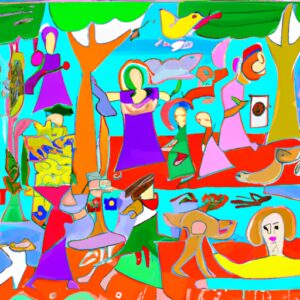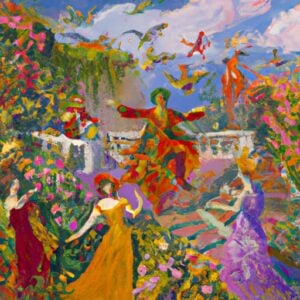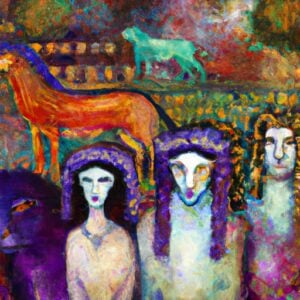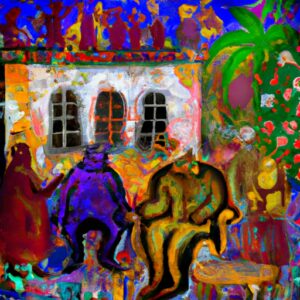In this article, we explore the most famous Italian opera songs that have left an indelible mark on audiences worldwide.
Exploring the most famous Italian Opera songs
Italy has been the birthplace of some of history’s most iconic and celebrated music works, and its operatic heritage is no exception.
Italian opera has captivated audiences worldwide with its powerful melodies, dramatic performances, and passionate storytelling.
From Verdi’s soaring arias to Puccini’s enchanting melodies, Italian opera has produced some of the most famous and beloved songs of all time.
In this article, we will journey through the world of Italian opera, exploring some of the most famous songs ever written and discovering the stories and emotions behind them.
Whether you are a longtime opera lover or simply curious about this timeless genre of music, this article will provide a glimpse into the magic of Italian opera and its enduring appeal.
The History of Italian Opera
Italian opera has a long and rich history from the 16th century.
The art form originated in Florence, Italy, in the late 16th century, and quickly spread throughout the country, becoming a popular form of entertainment for the wealthy and aristocratic classes.
The first operas were performed in private homes and were often commissioned to celebrate weddings and other special occasions.
The earliest operas were characterized by their use of recitative, a style of singing that imitated the rhythms and inflections of speech.
This allowed the singers to convey the emotions and drama of the story while still maintaining a sense of realism and naturalism.
In the 17th century, opera became more elaborate and sophisticated, with composers like Claudio Monteverdi and Francesco Cavalli introducing arias, duets, and other musical forms.
These works were often performed in public theaters and featured lavish sets and costumes, as well as large ensembles of singers and musicians.
The 18th century saw the rise of the Italian opera seria, a form of opera that was characterized by its serious themes and focus on virtuosic singing.
The composers of this period, such as Handel and Vivaldi, created operas that showcased the talents of individual singers, with elaborate arias and duets that highlighted their vocal abilities.
In the 19th century, Italian opera reached new heights of popularity and influence, with composers like Rossini, Bellini, Donizetti, and Verdi creating some of the most beloved and enduring works in the genre.
These operas often dealt with themes of love, tragedy, and heroism and featured some of the most iconic arias and duets in the history of music.
Today, Italian opera continues to be a vital and vibrant art form, with new works being created and performed around the world.
While the genre has evolved and changed over the centuries, its core values of drama, passion, and beauty continue to captivate audiences and inspire new generations of composers and performers.
The most famous Italian opera songs
Italian opera is known for its stunning melodies, powerful emotions, and unforgettable performances. Throughout its history, the genre has produced countless iconic songs that have become beloved by audiences around the world.
Here are some of the most famous Italian opera songs of all time:
“Nessun Dorma” from Turandot by Giacomo Puccini
- This aria is the most famous in all of Italian opera and has been covered by countless singers and musicians over the years.
- It is sung by the character Calaf, who is attempting to win the hand of the icy princess Turandot by solving her riddles.
- The song’s soaring melody and dramatic climax have made it a staple of opera performances and cultural events.
“La Donna e Mobile” from Rigoletto by Giuseppe Verdi
- This aria is sung by the character Duke of Mantua, who boasts about his many romantic conquests.
- Its catchy melody and upbeat tempo have made it one of the most recognizable and popular opera songs of all time.
“Va, Pensiero” from Nabucco by Giuseppe Verdi
- This chorus is sung by the Hebrew slaves in the opera, who long for their homeland and freedom.
- Its powerful lyrics and stirring melody have made it a symbol of hope and resistance, and it has been performed as an anthem for various social and political causes over the years.
“Largo al Factotum” from The Barber of Seville by Gioachino Rossini
- This aria is sung by the character Figaro, a barber who boasts about his many talents and skills.
- It’s fast-paced rhythm and playful lyrics have made it a crowd-pleaser, and it is often performed as a show-stopping number in opera productions.
“Un Bel Di Vedremo” from Madama Butterfly by Giacomo Puccini
- This aria is sung by the character Cio-Cio-San, who is waiting for her lover to return to her.
- Its haunting melody and poignant lyrics have made it one of the most moving and emotional moments in all of opera.
- These are just a few examples of the many famous Italian opera songs that have captured the hearts and imaginations of audiences around the world.
Each song has its own unique story, emotion, and musical style, and they continue to inspire and move listeners to this day.
The enduring appeal of Italian opera
Italian opera has captivated audiences for centuries with its rich musical language, powerful emotions, and compelling stories.
Despite the many changes in society and culture over the years, the enduring appeal of Italian opera remains as strong as ever.
Here are some reasons why Italian opera continues to hold a special place in the hearts of audiences around the world:
- Timeless Themes: Italian opera deals with timeless themes that continue to resonate with audiences today, such as love, passion, jealousy, and sacrifice. These themes are universal and speak to the human experience, allowing audiences to connect with the music and characters on a deep emotional level.
- Rich Musical Language: Italian opera is renowned for its rich and diverse musical language, which incorporates a wide range of styles and techniques. From soaring arias and duets to intricate ensembles and choruses, the music of Italian opera is always evolving and pushing the boundaries of what is possible.
- Dramatic Performances: Italian opera is known for its dramatic and theatrical performances, which combine music, acting, and stagecraft to create an immersive and captivating experience. From grand opera houses to intimate theaters, the performances of Italian opera transport audiences to other worlds and immerse them in the drama and beauty of the music.
- Iconic Composers and Works: Italian opera has produced some of the most iconic and enduring works in the history of music, including operas by composers such as Puccini, Verdi, Rossini, and Donizetti. These works continue to be performed and loved by audiences around the world and have become a cornerstone of the opera repertoire.
- Cultural Significance: Italian opera has played an important role in the cultural history of Italy and has had a significant impact on the arts and culture around the world. From its roots in the Renaissance to its modern-day relevance, Italian opera has been a source of inspiration and creativity for generations of artists, musicians, and performers.
Italian opera has endured for centuries due to its timeless themes, rich musical language, dramatic performances, iconic composers and works, and cultural significance.
It continues to be a beloved and influential art form that speaks to the heart and soul of audiences around the world.










One Response
I absolutely love Italian Opera! Can’t wait to see which songs made the list.